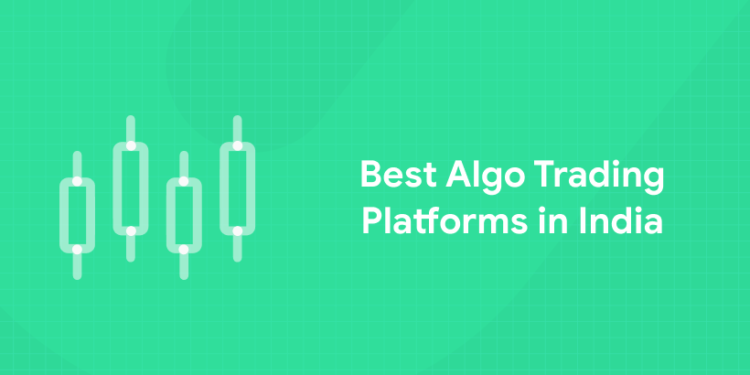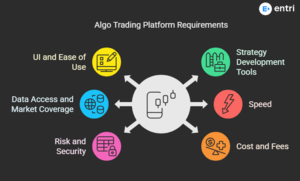Table of Contents
The trading and investing market has grown profoundly in the last couple of years. With different types of investments and stock trading, one can easily be at a crossroads. One such type of trading is ‘algo trading,’ which is slowly gaining prominence in the market. This blog is about what it actually is and what the top algo trading platforms in India are.
Introduction: What is Algo Trading?
Algo trading is short for algorithm trading, and, as the name suggests, it makes use of computers and software to automatically trade stocks. Often, traders need to be watching the market closely to get the best results, and this may not be possible all the time. This is when algo trading comes into the picture. You get to set some ‘rules’ or ‘conditions’ on the basis of which the stocks will be bought or sold when the value reaches a certain point.
This type of trading is often deemed to be faster and more efficient than trading manually. Algo trading has a couple of trading strategies that have proven to be efficient over the years. Here are some brief explanations for some of them:
Also read: Entri Finacademy is Now SEBI Compliant!
-
High-frequency trading (HFT)
The process involves making a huge number of trades in a very short period of time to capitalize on tiny price movements. The trades happen in really short periods, such as milliseconds or microseconds. Of course, this type of trading requires a lot of advanced technology and infrastructure. Highly sophisticated mathematical models are employed to detect patterns that indicate short-term opportunities, including small price changes and inefficiencies in price ranges between exchanges.
-
- Example: Imagine that the price of a stock differs between two exchanges. The algorithm detects this and buys the stock at a lower price on one exchange and sells it at a higher price on another exchange.
-
Market Making
Market making involves placing buy and sell orders for a stock or asset at a slightly different price. Such ‘makers’ get profit from the difference between the buying price (bid) and the selling price (sell). A market-making algorithm is deployed that constantly places orders to buy a stock at a lower price and sell it at a higher price. The orders are updated according to the market changes, and the algorithm ensures active trading through continuous adjustment of the prices.
-
- Example: Imagine a stock being traded at ₹100. The algorithm bids on the stock at ₹99.50 and sells it at ₹100.50. As long as the stock moves within this range, the profit would be earned through the ‘spread.’
What is a spread in trading?
‘Spread’ is a trading term that refers to the difference between the buying price (bid) and the selling price (sell). In other words, it is also the profit.
-
Arbitrage Trading
It exploits the price differences of the same asset across different markets or exchanges. When an asset is priced differently in two markets or exchanges, the algorithm can buy it at the low price from one exchange and sell it at a higher price in the other exchange. These opportunities are mostly seen in exchanges or different financial instruments.
-
- Example: If the price of gold is ₹50,000 per gram in the Bombay Stock Exchange (BSE) and ₹50,100 in the National Stock Exchange (NSE), an arbitrage algorithm will buy it in BSE and sell it in NSE to gain a profit of ₹100.
-
Trend Following
Essentially, the algorithm follows the trends exhibited by the market and makes a decision based on that. If the market is rising (bullish trend), the algorithm will continue to buy the stock, and vice versa. The trend movement is predicted by the algorithm, and a decision is made on that premise.
Also read: What is a Mutual Fund and how does it Work? (Complete Guide)
Requirements for an Algo Trading Platform in India
1: What is a stock?
Like we said before, there are tons of trading platforms in India, and if you are a beginner, you may not know the best ones out there. For that specific reason, we have curated a set of criteria while choosing an algo trading platform.
-
UI and Ease of Use
Let’s face it, many of us have discarded applications or websites on the basis of their user interface and layout. When it comes to UI or a user-friendly experience, it can be subjective. Well-designed interfaces make it easier to develop, test, and implement trading strategies. Not being comfortable with a trading platform in this context can lead to mistakes in the setup of your algorithms. So what makes a good and easy-to-use UI for an algo trading platform?
Firstly, a clean, structured design that will help you plan your algorithmic strategies with ease. Secondly, a customisable dashboard can be of great help in a trading platform. This is because you can customise what all information you want to see, filtering out all the unnecessary details that may slow you down. Finally, platforms that do not need complex coding should be preferred. Everyone may not be a ‘coding ninja.’
-
Strategy Development Tools
A good platform should provide the tools and options to test and develop strategies and trading algorithms. Three types of tools that you should consider are:
-
- Backtesting tools: Tools that backtest your algorithm against historical market data and determine its potential performance and risk before deploying it in real-time.
- Paper Trading: These tools allow you to test strategies in a simulated environment with live market data but without risking real money.
- Real-time strategy execution and optimization tools: Tools that can automatically adjust strategies based on market conditions.
-
Data Access and Market Coverage
The quality of market data available helps in the success ratios of the algorithms and strategies. Without accurate and high-quality data, your algorithms may fail to identify opportunities and execute trades correctly. Access to real-time data can be a driving force in good decision-making. Historical data and full market coverage need to be prioritised.
-
Speed
Algo trading is all about speed, and a delay in executing a trade can lead to losses. HFTs and arbitrage strategies rely on quick executions and low latency. A minimal delay between the signal from your algorithm and the actual execution of the trade needs to be ensured. Additionally, check for the co-location feature, where your trading system can be hosted directly on the same servers as the exchange’s systems, thus reducing latency. Also, if the platform can handle a large number of executions without delay, it is considered a good one.
-
Risk and Security
Cyber-attacks are ever increasing in India, and platforms should be having resources that counter such problems. After all, prevention is better than cure. Security features help in protecting your capital, avoiding large losses, and protecting sensitive trading data. Risk controls that automatically stop-loss orders when a trade reaches a certain loss threshold are a feature to watch out for. Industry standard encryption, like two-factor authentication, is necessary in today’s trading circumstances.
-
Cost and Fees
Most platforms require fees as part of the trading, and in the case of deploying strategies, the same applies. A deep understanding of the fee structure can help in preventing the fees from eating into your profits. Ensure you know how commission fees are charged: whether per order, trade, or monthly. Access to market data may also come at a cost in most platforms. There are multiple platforms that even charge fees for withdrawals.
-
Customer Support and Educational Resources
Algorithmic trading, just like normal trading, may lead to losses and mistakes. Under such circumstances, having responsive support is essential for fast solutions. Educational resources are also valuable in gaining an in-depth understanding of trading. Some features that are to be checked include 24/7 support, detailed guides, documentation, tutorials, user forums, webinars, access to expert communities, etc.
Also read: Mutual funds vs Fixed Deposits: Which is better?
Best Algo Trading Platforms in India
Now that you have an idea as to how algo trading works and how to choose one, it’s time to check out the best algo trading platforms in India. This comprehensive list was curated by our experts in the field.
1. Zerodha
Zerodha is one of the most well-known and popular stockbrokers in India. It provides a powerful trading platform called Kite, which is known for its simplicity, speed, and powerful features. Zerodha’s Kite Connect API is designed specifically for algorithmic traders, allowing them to build their own automated trading systems and strategies.
Key Features:
-
Kite Connect API: It allows users to integrate third-party applications and custom-built algorithms for automated trading.
-
Fast Execution: Zerodha is known for its quick order execution and low-latency trading experience, ideal for algorithmic traders.
-
Backtesting Support: Zerodha provides access to historical data for testing strategies, allowing traders to evaluate their strategies before going live.
-
Affordable Brokerage: Zerodha’s brokerage is low, with a flat fee of ₹20 per order, making it cost-effective for both high-volume and retail traders.
Benefits:
-
User-Friendly Interface: Kite’s intuitive interface is easy to use, even for those new to algorithmic trading.
-
Extensive Documentation: Zerodha provides excellent documentation and API guides to help you get started with algorithmic trading.
-
Market Coverage: Access to a wide range of assets including equities, commodities, and currency futures.
2. Upstox (Upstox API)
Upstox is a leading discount broker in India that offers competitive pricing and powerful tools for active traders, including those involved in algorithmic trading. Upstox’s Upstox API allows users to implement automated trading systems, integrate with external tools, and access real-time market data.
Key Features:
-
Upstox API: The API allows users to access real-time market data, submit orders, manage portfolios, and monitor trades through custom algorithms.
-
Multiple Market Access: Provides access to equity, commodity, and currency markets in India.
-
Trading Terminal: The Upstox Pro platform offers fast order execution and a customizable trading interface suitable for algo trading.
-
Low Brokerage Fees: Upstox offers a competitive brokerage model, with a flat rate for equity trading and low commissions for other segments.
Benefits:
-
Low-Cost Trading: Upstox has one of the most competitive pricing models, with low transaction costs and no hidden fees.
-
Easy Integration: The platform supports integration with third-party applications and trading algorithms.
-
Customizable APIs: You can access a wide range of functionality from placing orders to risk management, making it a great choice for those looking for flexibility.
3. Interactive Brokers (IBKR)
Interactive Brokers (IBKR) is a globally recognized platform, and it also serves Indian traders with access to international markets. It offers IBKR’s API, which is ideal for professional traders and institutions who need a robust platform for algorithmic trading.
Key Features:
-
IBKR API: IBKR’s API gives access to real-time data, market orders, and the ability to execute strategies in multiple global markets.
-
Access to Global Markets: Interactive Brokers allows you to trade across various international markets, including the US, UK, Europe, and Asia.
-
Advanced Risk Management: IBKR offers advanced risk management tools to safeguard your capital while executing high-frequency trades.
-
Low Margin Rates: IBKR provides low margin rates for traders who are looking to trade on margin or leverage their positions.
Benefits:
-
Advanced Tools for Algo Traders: IBKR offers a high degree of flexibility and powerful tools for custom algorithm development.
-
Comprehensive Data Access: You get access to a wide range of financial instruments like equities, options, futures, forex, and bonds.
-
Reliable Infrastructure: The platform is known for its robust infrastructure, ensuring reliable execution of high-frequency trades.
-
Global Market Access: Ideal for traders who want to implement strategies that work across multiple regions.
4. Fyers
Fyers is another prominent Indian stockbroker that offers algorithmic trading through its Fyers API. The platform is known for its simplicity and the availability of features that appeal to algorithmic traders.
Key Features:
-
Fyers API: Allows you to develop and implement your custom algorithmic trading strategies with access to real-time market data and direct order placements.
-
Backtesting Capabilities: Fyers offers backtesting features that let you evaluate your strategies against historical market data before applying them to live trading.
-
Low Brokerage Costs: Fyers offers competitive and low brokerage rates, making it a cost-effective option for algo traders.
-
Real-Time Market Data: Provides fast, real-time data to help traders execute their strategies accurately.
Benefits:
-
Affordable for Retail Traders: Fyers is very cost-effective, especially for traders who are just starting out with algorithmic trading.
-
Excellent API Documentation: The platform provides comprehensive guides and tutorials to help you develop your trading algorithms.
-
User-Friendly Platform: The platform is designed to be intuitive, even for users who are new to algorithmic trading.
5. AlgoTrader
Alice Blue is an Indian stockbroker that provides AlgoTrader, a platform specifically designed for algorithmic trading. It offers low-cost trading with advanced features suitable for retail and institutional traders alike.
Key Features:
-
AlgoTrader Platform: The platform provides a range of automated trading solutions and allows users to connect their custom algorithms for execution.
-
Trading Signals and Alerts: Integrated features for receiving signals and alerts based on market movements and trading strategies.
-
Backtesting and Optimization: The platform supports backtesting strategies using historical data to optimize performance.
-
Low Brokerage Rates: Alice Blue offers low brokerage rates, especially for frequent traders.
Benefits:
-
Customizable Algorithm Options: You can customize and optimize your strategies with detailed market analysis and backtesting features.
-
Risk Management Tools: Built-in tools to manage risk effectively while executing high-frequency trades.
-
Affordable Trading: With competitive brokerage fees, Alice Blue is an affordable option for traders looking to implement algorithmic strategies.
6. QuantInsti
QuantInsti is an algorithmic trading education and technology company that also provides a platform for trading algorithms. Their AlgoTrader platform is an advanced solution for quantitative and algorithmic traders in India.
Key Features:
-
AlgoTrader Platform: The platform is designed for professional algo traders and allows for the development, backtesting, and deployment of complex algorithms.
-
Quantitative Tools: It provides tools for quantitative analysis, strategy development, and high-frequency trading.
-
Real-Time Market Data: Access to high-quality market data from a variety of asset classes, including equities, forex, and commodities.
-
Customizable Interfaces: The platform is highly customizable, enabling traders to design strategies based on their needs.
Benefits:
-
Advanced Tools for Quantitative Traders: Ideal for users who want to implement complex strategies with robust data analysis tools.
-
Comprehensive Educational Resources: QuantInsti provides education alongside the platform, helping traders understand the theory and practical aspects of algorithmic trading.
-
Optimized Execution: The platform ensures high-speed execution of trades, which is essential for HFT and other time-sensitive strategies.
7. Tradetron
Tradetron is a popular platform in India for algorithmic trading that allows users to create, test, and deploy trading strategies without needing to write code. The platform caters to both retail traders and institutions.
Key Features:
-
No-Code Strategy Building: Users can build trading strategies using a simple drag-and-drop interface, making it accessible to non-technical traders.
-
Backtesting and Simulation: Tradetron provides robust backtesting features to test strategies with historical data and simulated market conditions.
-
Auto-Trading: Once the strategy is ready, you can automate the trading execution across different exchanges and asset classes.
-
API Integration: Tradetron allows integration with APIs for external tools, custom strategies, and other trading platforms.
Benefits:
-
User-Friendly Interface: The platform’s no-code approach makes it accessible to a broad audience, including those without programming knowledge.
-
Scalable: Tradetron can scale with your trading strategies, allowing you to handle more complex and large-scale strategies as you gain experience.
-
Affordable Fees: The platform is cost-effective for retail traders, with flexible pricing plans based on the number of strategies and connections used.
How to Choose the Right Algo Trading Platform For You
Refer this table to get an idea on which platform suits you the best..
| Platform | User |
| Zerodha | Beginners to intermediate traders who want a simple and cost-effective way to implement algorithmic strategies. |
| Upstox | Traders seeking a balance between low cost and powerful trading tools for algo strategies. |
| Interactive Brokers | Advanced traders and institutions who need access to a wide range of global markets and advanced risk management features. |
| Fyers | Beginner to intermediate traders who want to implement custom algorithms at a lower cost. |
| AlgoTrader | Advanced traders and institutions with a strong background in quantitative finance and algorithmic trading. |
| QuantInsti | Advanced traders and institutions with a strong background in quantitative finance and algorithmic trading. |
| Tradetron | Retail traders and non-technical users who want to engage in algorithmic trading without needing to code. |
Also read: Why Should Women Be Financially Independent?
Best Algo Trading Platform: Final Thoughts
Algo trading offers numerous benefits, which you are aware of by now. Choosing the right platform is a vital part of your journey towards gaining profit from algorithmic trading. Consider all the factors that have been listed here and check out all the platforms on that basis. May this be the first step towards financial independence and success. All the best for your endeavour.
Entri provides a lot of insights on various forms of trading, along with courses on Forex trading, Stock Market, and Mutual Funds. If you feel like algo trading is not your cup of tea, then feel free to check out these courses and start your journey with Entri.
| Achieve Financial Freedom with these courses? | |
| Stock Market Trading Course | |
| Forex Trading Course | |
| Mutual Funds Course |
Stock Market Training Reviewed & Monitored by SEBI Registered RA
Trusted, concepts to help you grow with confidence. Enroll now and learn to start investing the right way.
Know moreFrequently Asked Questions
What is Algorithmic Trading?
Algorithmic trading (algo trading) is the use of computer algorithms to automatically execute trading strategies in financial markets. These algorithms are based on predefined rules and can execute trades at optimal prices and speed, often without human intervention.
What are the best algo trading platforms in India?
Some of the best algo trading platforms in India include:
-
Zerodha (Kite Connect): A popular trading platform with powerful API tools for algorithmic trading.
-
Upstox: Offers seamless trading APIs with low latency and high reliability.
-
Interactive Brokers: An international broker with an advanced API for professional algo traders.
-
TradeSmart: Known for its robust API for automated trading strategies.
-
Fyers: Provides easy-to-use APIs for traders who wish to automate their trading strategies.
How much capital do I need to start algo trading in India?
The capital required to start algo trading in India varies based on the platform and the type of trading you wish to engage in. Typically, you can start with as little as ₹10,000-₹25,000, but larger capital is required for more complex strategies or higher-frequency trading.
Do I need programming skills to use an algo trading platform?
While programming knowledge can be beneficial, many platforms in India offer user-friendly interfaces that allow traders to create and backtest algorithms without deep coding skills. However, a basic understanding of Python or other coding languages is helpful if you want to build more advanced strategies.
What are the fees associated with algo trading platforms in India?
Fees for algo trading platforms can include:
-
Brokerage Fees: Some platforms charge a fixed or percentage-based brokerage fee per trade.
-
API Charges: Some platforms have additional charges for using their trading APIs.
-
Data Fees: If you require real-time market data, platforms might charge extra for data feeds.
-
Software/Subscription Fees: Some advanced trading platforms may have monthly or yearly subscription costs.
Always review the fee structure of each platform before committing.
Can I use any trading strategy with these platforms?
Yes, most algo trading platforms support a wide range of strategies, from simple moving average crossovers to complex machine learning-based models. However, the success of these strategies depends on your understanding of the markets and the algorithms you develop.
Is algorithmic trading legal in India?
Yes, algorithmic trading is legal in India. The Securities and Exchange Board of India (SEBI) regulates algorithmic trading to ensure fairness and transparency in the market. Traders must ensure their strategies comply with SEBI regulations, and platforms providing algo trading services must also be SEBI-approved.
Can I automate my trading strategy with no prior experience?
While you can automate basic strategies without prior experience using user-friendly platforms, a solid understanding of market trends, risk management, and technical analysis is important for developing successful strategies. If you’re a beginner, consider using demo accounts or learning resources to understand the nuances of algorithmic trading.
















